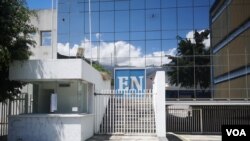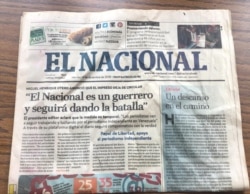One of Venezuela’s oldest newspapers was evicted from its own building Friday, after members of the National Guard, accompanied by a judge, executed a court order.
The Caracas offices of El Nacional were seized as part of a civil defamation case in which a court ordered the media outlet to pay more than US $13 million to Diosdado Cabello, a high-ranking official in Venezuela’s ruling Socialist Party and former president of the National Assembly.
Miguel Henrique Otero, the paper’s editor-in-chief who lives in exile in Madrid, Spain, compared the court order to “a robbery” and said it was proof that freedom of the press no longer exists in Venezuela.
In April, Venezuela’s Civil Cassation Chamber of the Supreme Court of Justice ordered El Nacional to pay damages to Cabello as part of a civil defamation complaint filed after the outlet republished an article by Spanish news outlet ABC.
Cabello has denied any links to drug trafficking.
Otero said the seizure was “worse than expropriation” — where a government takes ownership of a property for public benefit — because it did not involve any legal procedure.
Lawyers for El Nacional plan to appeal. Because the media group publishes only online, it is still able to produce news content.
"The value of the building has nothing to do with the compensation," Otero said, adding that he believes the damages are "an arbitrary figure” that is unjustified.
The journalist compared the case to when Venezuela expropriated the studios of Radio Caracas Televisión (RCTV) in 2007. The then government of Hugo Chavez refused to renew the broadcaster’s license and a court ordered the military to seize control of RCTV’s equipment and installations, Reuters reported at the time.
RCTV was replaced by the state-run TVES television channel, but in El Nacional’s case, Otero said, his building was turned over to Cabello. “They make him a millionaire,” he said.
Cabello was cited on May 12 as saying on Twitter that the El Nacional building is not for the Venezuela government, and demanded that Otero pay the damages ordered by the court. “You can pay me in cash, or by check (with verified funds) I’ll use the money to buy vaccines. If not, I will have to seize your properties,” Cabello was cited as saying.
The lawmaker said that he intends to use the building for a university of communications.
"The U.S. and media rights groups have condemned the actions against El Nacional.
Julie Chung, acting assistant secretary for the U.S. State Department’s bureau of Western Hemisphere Affairs, said on Twitter, “The raid on [El Nacional] is not against a building or property, but against freedom of the press. This responsibility for this violation falls directly on the regime.”
The New York-based Committee to Protect Journalists (CPJ) described the court order as “the latest step in a long and arbitrary process of judicial harassment and abuses” against El Nacional for its reporting on corruption.
“By taking control of the headquarters of one of the most influential outlets in the country, Venezuelan authorities have shown they will go to extraordinary lengths to suppress independent news,” Natalie Southwick, who heads CPJ’s South and Central America program said in a statement.
Venezuela has a poor press freedom record, scoring 148 out of 180 counties, where 1 is the most free, according to an annual index compiled by Reporters Without Borders (RSF). The media watchdog cites harassment of independent media, arbitrary arrests and a “tense climate” that has led many journalists to flee.
Founded in 1943, El Nacional is one of Venezuela’s oldest newspapers. Under Nicolás Maduro’s government, it has faced obstacles to its reporting, including administration officials who refuse to speak to its staff, government advertising being pulled, and a shortage of paper forcing the daily to eventually move online.
As part of the Cabello lawsuit, a court in 2015 imposed a travel ban on Otero and around 20 other journalists, staff and shareholders at the paper, according to the CPJ.
Otero told VOA that the newspaper's archives "are outside" of the building. Venezuelan analysts, intellectuals and journalists say that with nearly 80 years’ history, El Nacional has one of the largest and more complete archives in the country.
This article originated in VOA’s Spanish-language division.





